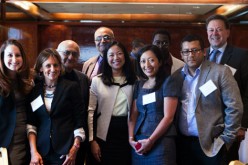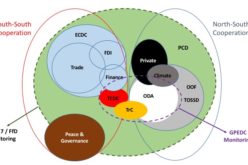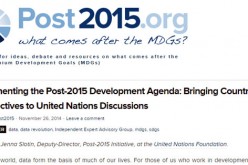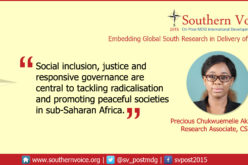Why long-term finance is so important for Latin America
Originally published on Development Progress

Andrea Ordóñez is Research Coordinator for the Southern Voice initiative.
Although discussing how to accelerate the progress on the Millennium Development Goals (MDGs) is important, in the case of Latin America, the key aspect over the next two years is to establish a long term strategy to finance development. The region as a whole has seen important progress towards various targets: the decline in poverty is both one of the most notable and challenging of the achievements. However, as a recent study from the World Bank shows, despite this continued decline, 30% of the population in the region is still poor (albeit with a poverty line of US$4 a day, significantly higher than the US$1.25 a day line of the MDGs). If economic growth and the social programs in place are maintained, further progress can be expected over the next two years.
Yet focusing on new programs and strategies might not be a plausible strategy to acceleration since results will not be visible in the short term. Rather one of the key questions looking forward is what happens to those who move above this poverty line. This same study reveals that 38% of Latin Americans are vulnerable to falling back into poverty (defined as those with a probability of falling back over 10%). Although the progress of the region is uplifting, one must not fall in the trap of thinking that the region now has a strong middle income class. Latin America still has high levels of inequality and most of the reduction in poverty has been triggered by economic growth led primarily by a commodity boom.
Now that many countries are succeeding in tackling poverty, it is important to consider how to maintain the progress being made. I believe that the key challenge for Latin America, and for many countries in other regions, is to develop and maintain a solid financial strategy to sustain this progress in the long term – something even more important than a strategy to accelerate change. As we see from the existence of a high vulnerability to falling back into poverty, to work for the wellbeing of people is far more complex than reaching a fixed target, which is after all only a milestone in a process.
Focusing on strategies for a working and sustainable financing mechanism is essential to maintaining progress in the long run for the following three reasons:
1. The first step out of poverty does not mean a direct progression to the middle class. As a result, those who step out of poverty are highly vulnerable and can fall back into poverty if economic shocks occur or if there are significant changes in social programs and monetary transfers. Governments throughout the region are grappling with this challenge and trying to find the right balance between investment in the present and in the future.
2. As some of the initial challenges in the alleviation of poverty are met, the next generation of goals will require further and smarter investments. As the goal for universal primary education is accomplished, for example, new challenges emerge in the provision of secondary education; larger numbers of students are likely to require a significantly larger investment. Furthermore, it is not only the amount of investment available but how intelligent the investment can be. If we take the quality of education, for example, smart investment is not as simple as building a new school or providing new equipment. The challenge is to change practices within the school and families; for this a set of complex public policies are required.
3. As the Southern Voice Initiative has stated with the first approximation to the MDGs, goal 8 (concerning the strengthening of a global partnership for development) remains the weakest link in the implementation of the MDGs. The discussion about this goal tends to focus on Official Development Assistance (ODA), but this narrow perspective prevents a broader discussion on the long-term financing of the public policies put in place to achieve the goals. Indeed, this trend is also observed in the draft outcome document on the MDGs. Latin America, a region that is no longer a priority for ODA, is far from having the stable financing necessary to maintain the progress made so far, which should encourage us to reconsider the purpose of MDG 8.
Discussing the long-term international financing of development is not an easy task. Opening up the discussion beyond ODA internationally would entail entering into complex negotiations on trade in the World Trade Organization, the carbon markets, and even sovereign funds. All these topics are usually considered beyond the realm of the development agenda. This leaves countries seeking other alternatives to finance their own development.
For example, the extraction of natural resources has become one of the main engines for growth in many countries in Latin America. These resources, however, bring their own set of challenges known as the resource curse. Looking forward to a new agenda that seeks to decouple economic prosperity from environmental degradation is crucial. Latin America, with its high reserves of water and biodiversity alongside significant deposit of minerals, must face this challenge head on.
We must now push for a more integral perspective on development finance. This is the single most important element to achieving, and sustaining, the MDGS; it also links the discussion on the MDGs and the development agenda, on the national and the international level, with the broader international-relations debate. As such, it should be seen as key to maintaining progress in the long term.
1,279 total views, 1 views today








